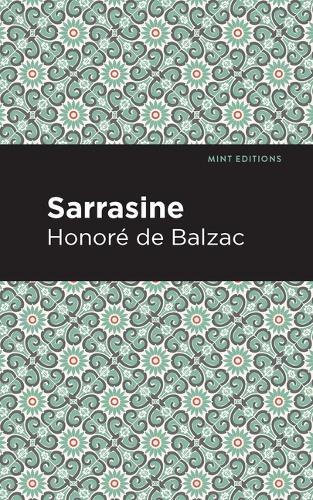
Sarrasine
(Hardback)
Publishing Details
Sarrasine
By (Author) Honore De Balzac
Contributions by Mint Editions
Mint Editions
Mint Editions
10th March 2021
United States
Classifications
General
Fiction
Classic fiction: literary and general
Physical Properties
Hardback
36
Width 127mm, Height 203mm
Description
Sarrasine (1831) is a novella by French author Honor de Balzac. Written as part of his La Comdie humaine sequence, Sarrasine is one of Balzacs earliest works published without a pseudonym and helped to establish his reputation as a serious writer and distinguished member of Parisian high society. Noted for its controversial exploration of homosexuality and castration, Balzacs novella would become the subject of Roland Barthes groundbreaking work of literary criticism, S/Z (1970).
Composed as a frame narrative, Sarrasine begins during a ball at the mansion of the wealthy Monsieur de Lanty. The unnamed narrator, from a window overlooking the garden, listens to the conversations of partygoers and watches as his guest, Beatrix Rochefide, is approached by a mysterious older man. The next night, the narrator tells Beatrix a story involving the man, a respected member of de Lantys circle. He begins with the life of Ernest-Jean Sarrasine, a successful young sculptor who, on a trip to Rome, fell in love with an opera star named Zambinella. Convinced she represents the ideal feminine form, he rejects Zambinellas misgivings and vague excuses, becoming increasingly obsessed with the beautiful singer. Devising a plan to kidnap Zambinella during a party at the French embassy, Sarrasine discovers the truth: the singer is a castrato, a classical operatic performer who was selected and castrated before puberty. Sarrasine, a powerful novella, explores themes of idealization and obsession while illuminating the conflation of sex and gender.
With a beautifully designed cover and professionally typeset manuscript, this edition of Honor de Balzacs Sarrasine is a classic of French literature reimagined for modern readers.
Author Bio
Honor de Balzac (1799-1850) was a French novelist, short story writer, and playwright. Regarded as one of the key figures of French and European literature, Balzac's realist approach to writing would influence Charles Dickens, mile Zola, Henry James, Gustave Flaubert, and Karl Marx. With a precocious attitude and fierce intellect, Balzac struggled first in school and then in business before dedicating himself to the pursuit of writing as both an art and a profession. His distinctly industrious work routine--he spent hours each day writing furiously by hand and made extensive edits during the publication process--led to a prodigious output of dozens of novels, stories, plays, and novellas. La Comdie humaine, Balzac's most famous work, is a sequence of 91 finished and 46 unfinished stories, novels, and essays with which he attempted to realistically and exhaustively portray every aspect of French society during the early-nineteenth century.
